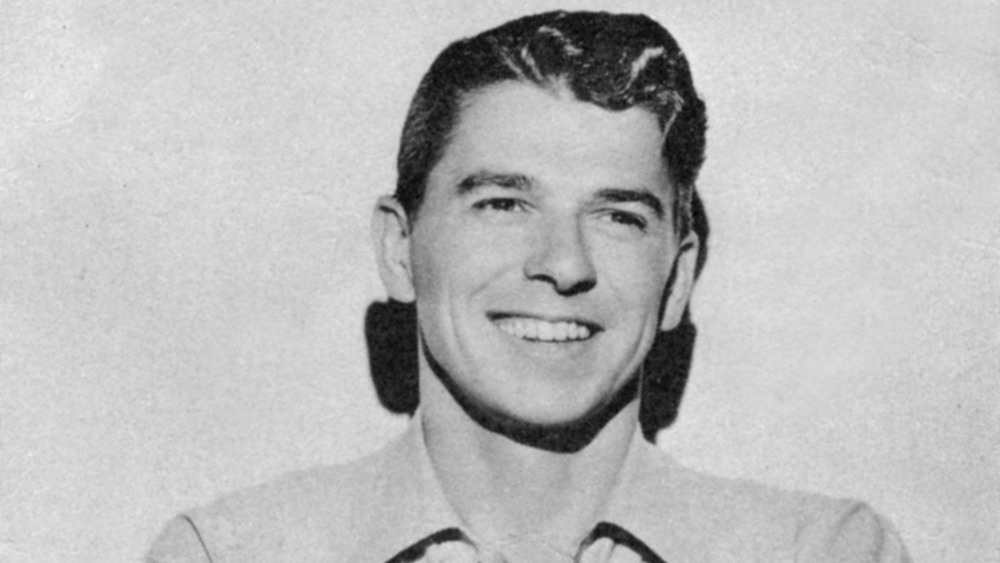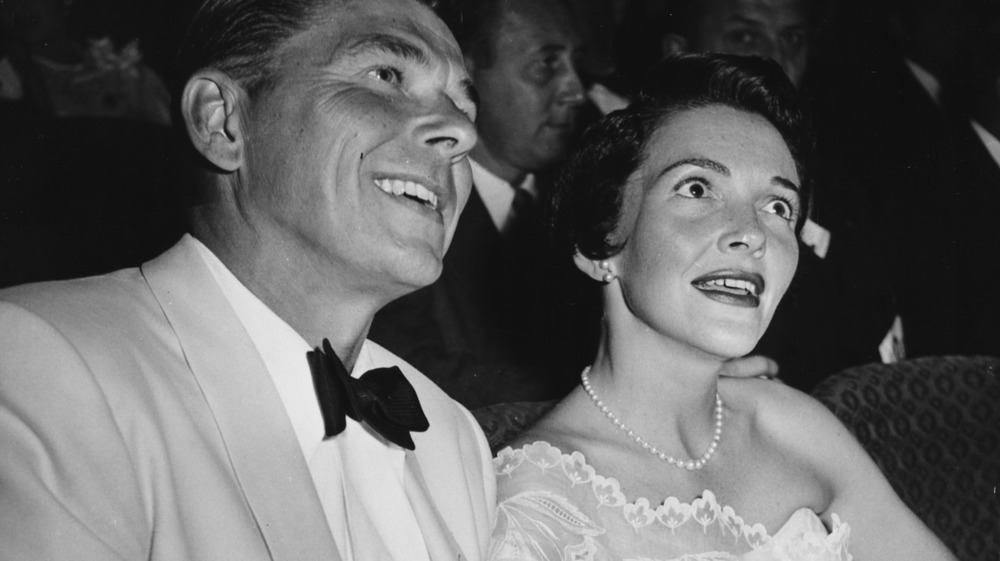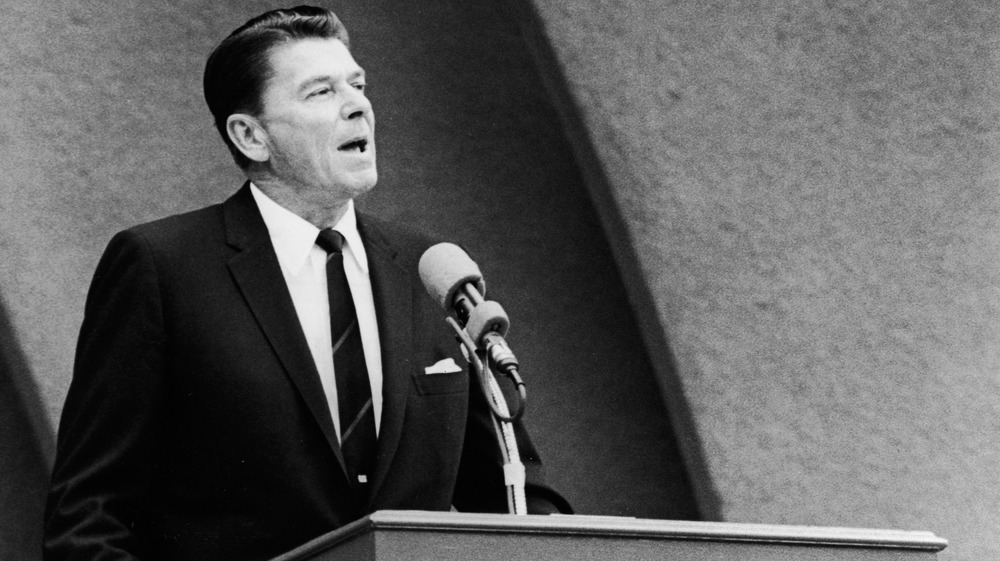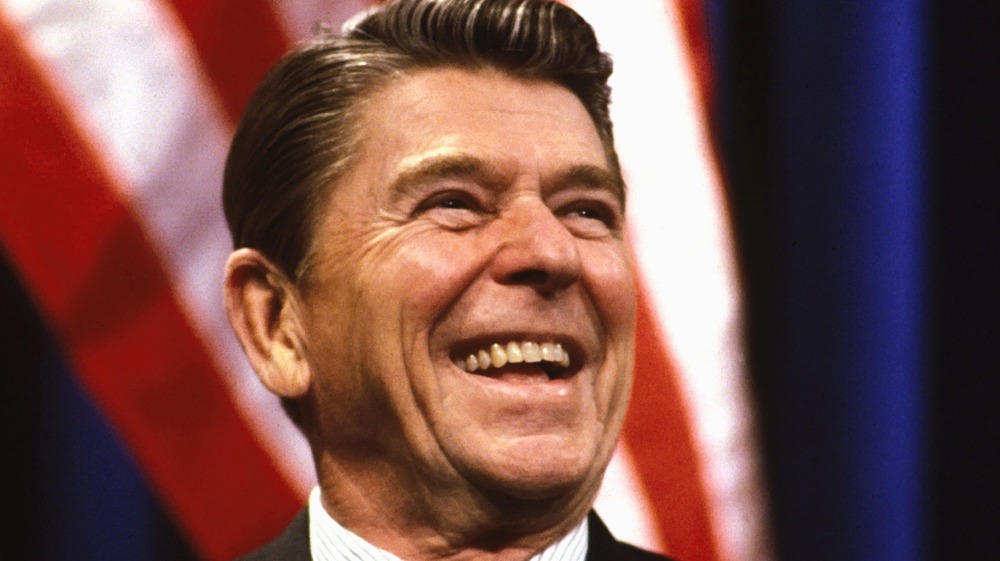The Truth About Ronald Reagan's Show Business Career
During his two terms as president (1981-1989), Ronald Reagan personified a certain kind of American dream — the idea that a regular kid, born above a general store in a small town in Illinois, could become not only famous but rise to the loftiest imaginable office. It was the kind of story tailor-made for the excesses of the 1980s, when countless Americans believed that fame and power were within reach, if only they could catch a break or two. But Reagan's story was a singular one.
Not even a certain contemporary reality star-turned-politician ever really came close. Whatever your political beliefs, there's no denying Ronald Reagan always seemed to somehow be in the right place at the right time to ride whatever the cultural zeitgeist of the moment was. For Reagan, that charmed timing began with a radio gig, secured when that medium was king. He later parlayed that into an acting career during Hollywood's Golden Age, followed by a lengthy term as governor of California (1967-1975), and finally a successful bid for the White House. And while we're used to the worlds of Hollywood and D.C. mixing these days, it was still unusual back then, though Reagan never saw it that way. Per Thoughtco, when he was reportedly asked during his presidential campaign how an actor could run for president, Reagan replied, "How can a president not be an actor?"
Reagan's road to Hollywood
Davenport, Iowa, is an unusual place for a Hollywood career to begin, but a radio job covering local sports for $10 a game was Reagan's introduction to the spotlight. According to the Miller Center, Reagan had a special trick for sounding natural on the airwaves: he'd memorize the first line of every commercial he read, so it sounded natural. It worked, so he continued to use it — no doubt laying the groundwork for his popular folksy demeanor as president. With his broadcasting skills, he quickly rose through the ranks, eventually calling Chicago Cubs games. It was on a spring training trip to Los Angeles that Reagan had a fortuitous run-in with a Hollywood agent who needed a look-alike to sub in for an actor who'd died in a car accident.
Reagan passed the Warner Bros. screen test and was immediately added to their stable of talent. Warner Bros., like many of the other major players during Hollywood's Golden Age, was part of the "studio system." This meant that everyone from directors to bit players was on contract and would be assigned to whatever projects the studios wanted to produce. Reagan was earning $200 a week then, according to the Miller Center, and appeared in more than 50 pictures, including 1940's Knute Rockne — All American. It was this portrayal of George Gipp, the legendary Rockne's friend and teammate who implored him to "win one for the Gipper," that forever attached that nickname to Reagan.
WWII changes everything
A year after that star turn, Reagan (a longtime reservist) was called up to active duty when the U.S. entered WWII. Thanks reportedly to his poor vision, Reagan avoided activity duty overseas and was instead assigned much closer to home, in the Army Air Corps First Motion Picture Unit. Here, he narrated training films and also starred in several pictures made to drum up patriotic fervor on the home front.
Ronald Reagan's post-war years were a mixed bag of personal successes (like a marriage to actress Jane Wyman and the birth of his first children) and professional dissatisfaction. Even at the height of his career in Hollywood, Reagan was never what we'd think of today as a superstar. He was a popular working actor but not enough to sustain the same level of success after years away during the war. His marriage couldn't withstand the stressors and he and Wyman divorced. In 1952, he remarried another actress, Nancy Davis, and the couple went on to have two children. Despite this personal happiness, Reagan's career continued to founder until 1954, when he was offered a job hosting "General Electric Theater," which went on to be a huge success. His final role was on the Western Death Valley Days, from 1964 to1965.
Ronald Reagan's Hollywood legacy
From the time Ronald Reagan entered the political arena, his past as an actor was often referenced, despite the fact that, as Hollywood Art bluntly puts it, "were it not for Ronald Wilson Reagan's other career as commander and chief, his film legacy might have gone largely unnoticed in the annals of Hollywood history." It's true that Reagan's career was never legendary, but it's also true that his career in Hollywood left an indelible mark on the man who would become president.
Throughout his presidency, Reagan was often referred to as "The Great Communicator" for his ability to translate wonky political discourse into words average Americans could understand, a label Reagan often rejected, per Heritage. In his final presidential address, he explained the epithet away, saying "I wasn't a great communicator, but I communicated great things." That may be so, but given the rhetorical skills he learned as a broadcaster and the assured delivery he honed as an actor, it's likely many Americans would never have noticed the distinction.



